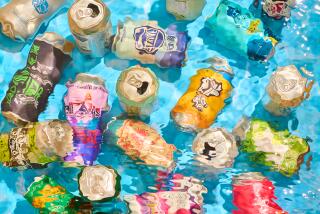Are craft brewers using irresponsible labels to compete with the big boys?
In the war for your beer money, craft breweries have learned to leverage what some are calling an unfair advantage over the big industrial brewers -- the label on the bottles.
Beer and breweries are, for better or worse, subject to stringent regulation from the federal government. After years of legislation and a long status quo of a marketplace dominated by giant brewing conglomerates, many of the laws that aim to control the flow of beer from brewery to consumer tend to favor these same big players. But, as pointed out by Dan Fox in an article for the Drinks Business, there’s one area craft breweries are finding an advantage -- marketing.
Fox, a longtime big beer advertising executive (who coined the disingenuous “Frost-Brewed” slogan for Coors Light), explains:
“One of the restrictions placed on breweries long ago prevented them from saying certain things about their beer. ‘Responsible marketing’ meant avoiding unseemly selling tactics... Many marketing gimmicks in advertising, naming, and labeling were placed off-limits. This was especially true for wording or images deemed to promote underage drinking, celebrate alcohol-effect, or encourage irresponsible consumption. It was hard to disagree with these marketing no-fly zones, so beer companies learned to live with the restrictions, and in great part, police themselves. Ultimately, promoting responsible consumption became a point of pride for every major brewer, and for their distributors as well.”
But, in an increasingly competitive marketplace, some craft brewers seem to be skirting the rules that discourage cartoon characters or beer names that boast of potency. Fox points to 10 examples of craft brands that seem to flout regulatory conventions, including Founders Brewing’s All Day IPA (suggestive of binge drinking, he says) and Dogfish Head’s hoppy tribute to the Grateful Dead (which sports the deadhead bear on the label and he says “appeals to children.”)
Check out Fox’s full piece for a great graphic illustrating some craft beer labels that might skirt “responsible marketing.”
Fox summarizes his take:
“Responsibility-challenged appeals like these can be powerful marketing weapons, especially when aimed at the coveted younger drinker group. Permitting their use effectively grants a competitive edge to the brand owners. And since most craft brewers rarely advertise in more expensive media, label-rendered brand identities often represent their most important marketing investment. It’s a very advantageous place to garner special treatment, especially if a brewer is not constrained by conscience.”
Are some craft breweries using an unfair advantage when creating their brands? It’s hard to agree when it is so difficult to define what “fair” is in the first place. The beer industry has a long history of backroom-dealings, cutthroat competition and a creativity-stifling hegemony; perhaps a little competitive advantage is what was needed to bring some balance back to the marketplace.
Besides, as Fox states, these “responsible marketing” rules have largely been self-enforced by the breweries. If the Alcohol and Tobacco Tax and Trade Bureau (the agency that regulates the beer industry) is approving these craft beer labels, who can blame the brewers for trying?
Fox even includes an anecdote about a craft brewer who was surprised by some of the labels that have been approved. If the government agency responsible for enforcing the regulations approves, how can one claim unfair advantage?
ALSO:
17 recipes to celebrate St. Patrick’s Day
Water-to-wine machine a hoax -- for charity
Roy Choi opens his Pot Cafe in Ktown’s Line Hotel
More to Read
Eat your way across L.A.
Get our weekly Tasting Notes newsletter for reviews, news and more.
You may occasionally receive promotional content from the Los Angeles Times.










